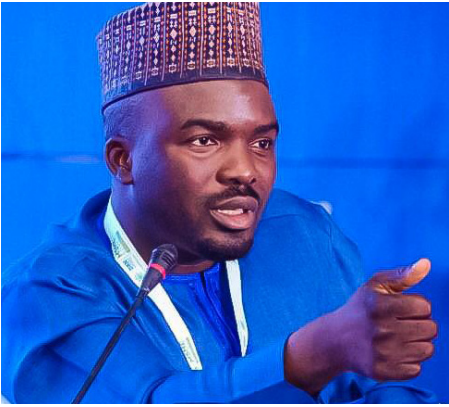HASSAN RILWAN is the Executive Secretary of Kaduna Scholarship and Loans Board, who has transformed the award of bursaries and scholarships from who you know to what you know, explains how he achieved this feat in the interview below.
Recently, the Kaduna State Scholarship and Loans Board opened its portal for suitably qualified candidates to apply for sponsorship. In what way is the scheme different from the previous arrangement?
Essentially, the difference is that we have been able to automate the system, to make sure that we remove, to the best of our ability, human interface. This affords us the opportunity to remove subjectivity from the process. It is extremely important that we keep the process as transparent as possible. So, the current scholarship scheme is in two categories; we have the merit-based and the need-based. We are interested in keeping it within these two broad bouquets.
You knew that there was a pronouncement from His Excellency, the Executive Governor of Kaduna State, Malam Nasir El-Rufai, that all First Class graduates from the State, should be sponsored to the best 50 universities in the world. The mandate is to ensure that we have a scheme that allows them to apply and to go through the process and once they are qualified, they are sponsored. The category of need-based is targeted at the poor and the needy.
How do you determine the poor and the needy? Is it by the rule of thumb or is there a process?
As you are aware, anybody can come forward and say he is poor or needy. But we have introduced a simple scientific approach. If you want to apply under the banner of the needy, you have to go through the checks. If you are too big to be checked, then this type of scholarship is not meant for you. First, you will provide us with your Tax Identification Number (TIN) and that of your parents’ as well as your Bank Verification Number (BNV) and that of your parents’. The essence is that we want to ascertain your access to funds, your earning and spending capability. So, if you are below a threshold, you are going to earn some marks of +10. If you are above the threshold, you are going to get -15 marks. That helps us to make some economic re-balancing, to make sure that the children of the needy, that may not have had access to qualitative education, will be discounted for by giving them that extra marks, on account of being below that threshold; while children of those who have the economic wherewithal, who may have gone to better schools, will have to score higher to remain in that threshold.
Due to financial non-inclusion, parents of those applicants who fall under the category of the poor and needy may not have bank accounts. How are you going to verify such cases?
If parents are aware that they should fulfill certain conditions in order to benefit from the scheme, I think that they will do the needful. But for students, we cannot pay outside the bank. And if they don’t have TIN, every Local Government has a tax office. They can go there and do a self-assessment. So, even if you are a peasant farmer and you do a self-assessment of just N100, you will get a tax certificate. And that certificate validates the need for your ward to qualify under the need-based bouquet.
For those who present new bank accounts to show that they or their wards are qualified to access the need-based category, we will run a check in all the banks, via the BVN, to ascertain whether their claim is correct or not. So, if the person has just N5 or N10 in the account, so be it. We will use that as a basis to assess him. The essence of requesting the TIN and BVN is not to put out the parents of the needy; it is actually increasing the entry limit of the affluent, who hitherto would have benefitted. The more we take the affluent or those with the wherewithal outside the net, the more the chances of bringing the needy into the scheme.
You talked about the scaling system, where certain thresholds will give you certain marks for eligibility to benefit from the scheme. Can you expatiate?
Let’s say the minimum is 50%. For a child that is determined to be below the economic threshold, if that child scores say 40 marks, he should ordinarily be disqualified. But on the account that he is below the threshold, he earns 10 marks. These 10 marks, when they are added to the 40 marks that he scored, he gets 50 marks. He becomes qualified. For a child whose access to funding is above the threshold, that child will get a -15 marks. That means, if 50 marks is the minimum entry qualification, that child has to earn 65 marks to be qualified. But if we have a child that we determined to be needy and he also earns 50 marks, he will have a kind of red label against his name.
So, we are going to take care of all the red labels that scored say 50 marks, before we now consider those children that are above the threshold. The essence of this is give preference to children that are needy, who are likely not to go to good schools. And who are likely to be outside if we didn’t have this system.
Apart from the needs-based, what other module do you have?
We have scholarship for disabilities. The thrust of this administration is to ensure that every citizen of Kaduna State, irrespective of their circumstances, has access to quality education. So, when you have students with disabilities, typically in the society, less emphasis is placed on them. In Kaduna State, education is a leveller. So, we have created a bouquet for the disabled to have access to the best universities in the world. To be able to access this scholarship, they must provide a medical certificate from a government owned hospital. That is the eligibility check.
Is it true that sports people also have a package in the new scholarship scheme?
Yes, we have a sports scholarship, which gives sports men and women the opportunity to pursue their sporting activities and academic excellence simultaneously. The idea is, if we give them the opportunity to go to the best schools in the world, they will have the chance to compete in great sports events and emerge as global athletes while at the same time, pursuing their academics.
In financial terms, what’s the difference between the scholarship and the bursary.
The bursary is a fixed amount; for undergraduates is N109,000, for medical students is N130,000 and for post-graduate is N130,000. For scholarship, once you are given a scholarship, we will pay your tuition and upkeep. It is pegged at N15 million while for medical students, it is N20 million. So, if you have any requirement above this, you can take a cocktail of scholarship and loan. There is a loans scheme in the Scholarship Board which affords you some amount of money, up to N5 million, with a repayment period of up to a period of five years maximum, with 8% interest.
Is a worker eligible for the loan in order to further his or her studies?
Every citizen of Kaduna State is eligible; whether you work for the State Government, Federal Government or private organisation.
Is there any bias in favour of certain courses while you are considering scholarship applications? For example, do science students stand better chances of sponsorship?
We have done a needs assessment of the skills gap in Kaduna State and the choice as to the courses that we will sponsor is based on this needs assessment. So, it is not based on whether or not you are an arts or science student. The portal can be accessed by all applicants on scholarship.kdsg.gov.ng. When you access it, you will find sections for ‘’Foreign Scholarship’’ and ‘’Local Scholarship’’. So, you will choose one. Thereafter, you will see the Merit-based, the Need-based, Sports and Disabilities bouquets. So, you will choose whichever one you want to apply. Then you will indicate whether it is Undergraduate or Post-graduate, then you click ‘’apply’’. You should also follow @kadss_lb on twitter for updates on local and international scholarships, bursaries and loans.
We are currently procession for 2019/2020 academic session. So, when you click apply, it will afford you the opportunity to create your own profile. Afterwards, a mail is sent to your personal email and the essence is to validate that email, to ensure that we have the right email to correspond with you. Once you have done that, you will go back to your profile and complete the entire details and to undertake the essay writing.
What is the essay all about?
The essay writing is a personal statement. This is a vetting process. It is a minimum of 100 words and a maximum of 250 words. Applicants are encouraged to keep their sentences short and keep their tenses right and to ensure originality. They should not copy from each other or from the internet. The result is automatically sent to your email, whether or not you pass. That removes any form of preferential treatment. An assessment software will mark the essay and check for plagiarism.
What are your greatest challenges on the job?
The major challenges are the misconception that scholarship and bursaries are a right and must be given once you are from Kaduna State or once you are connected. While it is true that every citizen of Kaduna State should have access to education which the State Government has made free up to secondary school; scholarship and bursaries must be earned since it cannot go round considering scarce funds and huge population. Another challenge is that some of the students are not used to the new system so they see it as a design to exclude them when in fact it is a design to ensure that every deserving student gets it.

 Join Daily Trust WhatsApp Community For Quick Access To News and Happenings Around You.
Join Daily Trust WhatsApp Community For Quick Access To News and Happenings Around You.


